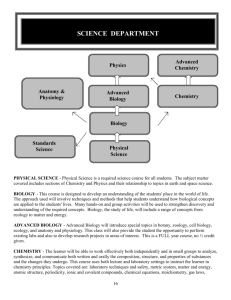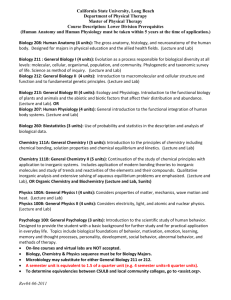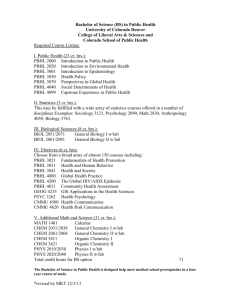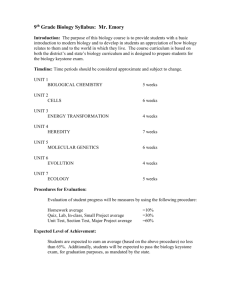D-planning document
advertisement
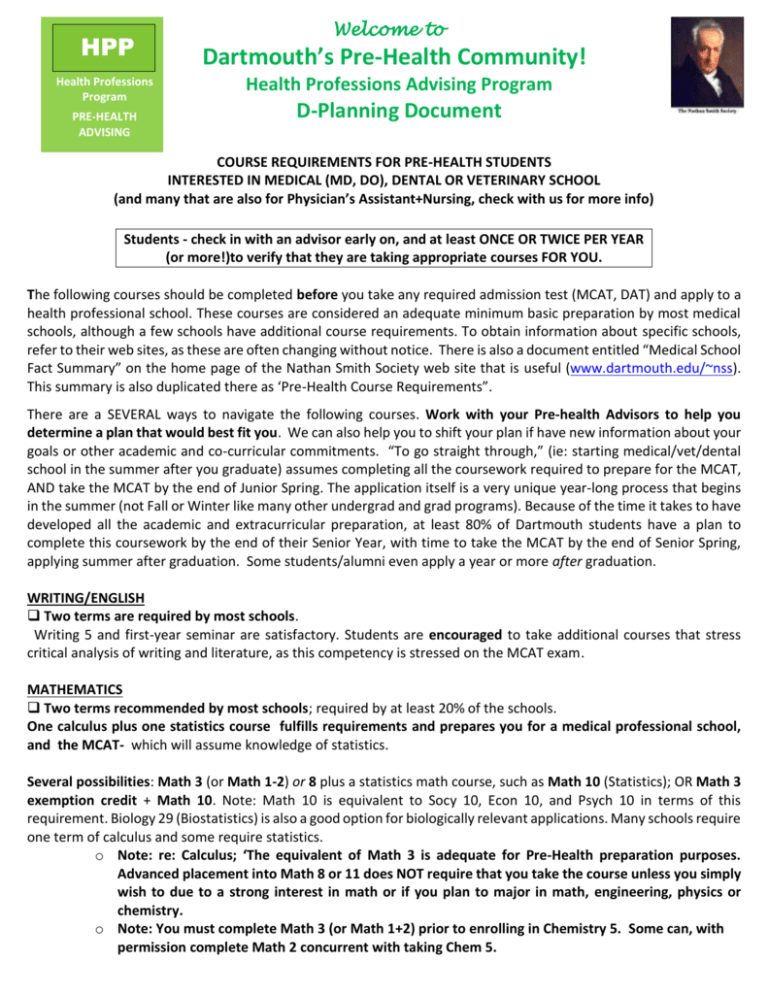
HPP
Health Professions
Program
PRE-HEALTH
ADVISING
Welcome to
Dartmouth’s Pre-Health Community!
Health Professions Advising Program
D-Planning Document
COURSE REQUIREMENTS FOR PRE-HEALTH STUDENTS
INTERESTED IN MEDICAL (MD, DO), DENTAL OR VETERINARY SCHOOL
(and many that are also for Physician’s Assistant+Nursing, check with us for more info)
Students - check in with an advisor early on, and at least ONCE OR TWICE PER YEAR
(or more!)to verify that they are taking appropriate courses FOR YOU.
The following courses should be completed before you take any required admission test (MCAT, DAT) and apply to a
health professional school. These courses are considered an adequate minimum basic preparation by most medical
schools, although a few schools have additional course requirements. To obtain information about specific schools,
refer to their web sites, as these are often changing without notice. There is also a document entitled “Medical School
Fact Summary” on the home page of the Nathan Smith Society web site that is useful (www.dartmouth.edu/~nss).
This summary is also duplicated there as ‘Pre-Health Course Requirements”.
There are a SEVERAL ways to navigate the following courses. Work with your Pre-health Advisors to help you
determine a plan that would best fit you. We can also help you to shift your plan if have new information about your
goals or other academic and co-curricular commitments. “To go straight through,” (ie: starting medical/vet/dental
school in the summer after you graduate) assumes completing all the coursework required to prepare for the MCAT,
AND take the MCAT by the end of Junior Spring. The application itself is a very unique year-long process that begins
in the summer (not Fall or Winter like many other undergrad and grad programs). Because of the time it takes to have
developed all the academic and extracurricular preparation, at least 80% of Dartmouth students have a plan to
complete this coursework by the end of their Senior Year, with time to take the MCAT by the end of Senior Spring,
applying summer after graduation. Some students/alumni even apply a year or more after graduation.
WRITING/ENGLISH
Two terms are required by most schools.
Writing 5 and first-year seminar are satisfactory. Students are encouraged to take additional courses that stress
critical analysis of writing and literature, as this competency is stressed on the MCAT exam.
MATHEMATICS
Two terms recommended by most schools; required by at least 20% of the schools.
One calculus plus one statistics course fulfills requirements and prepares you for a medical professional school,
and the MCAT- which will assume knowledge of statistics.
Several possibilities: Math 3 (or Math 1-2) or 8 plus a statistics math course, such as Math 10 (Statistics); OR Math 3
exemption credit + Math 10. Note: Math 10 is equivalent to Socy 10, Econ 10, and Psych 10 in terms of this
requirement. Biology 29 (Biostatistics) is also a good option for biologically relevant applications. Many schools require
one term of calculus and some require statistics.
o Note: re: Calculus; ‘The equivalent of Math 3 is adequate for Pre-Health preparation purposes.
Advanced placement into Math 8 or 11 does NOT require that you take the course unless you simply
wish to due to a strong interest in math or if you plan to major in math, engineering, physics or
chemistry.
o Note: You must complete Math 3 (or Math 1+2) prior to enrolling in Chemistry 5. Some can, with
permission complete Math 2 concurrent with taking Chem 5.
BIOLOGY
Two (2) terms with laboratory is the minimum requirement at most schools. At Dartmouth, those lab courses
include the foundation courses, Bio 12, 13, 14, 15, and 16. Most students with a pre-health interest take 12, 13, and
14.
**BIOLOGY SELF ASSESSMENT: All Dartmouth students should take the Biology department’s on-line Self-Assessment
exam and read about the academic indicators for whether to start Biology at Dartmouth with a lab course, or with our
Bio 11 (The Science of Life) or Bio 2 (Human Biology) Course, as their starting point.
Every student should have a conversation with a first-year or pre-health advisor as to the desirability of taking
either Biology 11, or Bio 2, before enrolling in the foundation courses.
Some will elect Biology 11. This course, offered each term, has no lab, and focuses on problem-solving in
Biology and prepares students to take the required laboratory-based courses. Some students will elect to take
Biology 2 and then proceed to a foundation course.
RE: BIO 2 Students who are uncertain about their interest in a health career or feel they need stronger
backgrounds in Biology (and science) based on exposure prior to matriculation at Dartmouth (perhaps as
reflected in their score on the evaluative exam) or who are hesitant about college science courses in general
should consider Biology 2 ('Human Biology') as their entry course in the fall of their first year. While this course
is not intended to provide all the skill sets typically used in the foundation courses, it does cover most of the
topics of Biology 11 and could serve as entry course for the foundation courses. Don’t be fooled by the course
number; it is definitely a course that would rigorously prepare most students for the foundation classes.
Of the lab based courses, 2 courses is the minimum requirement with many students choosing as the two courses
Biology 12 ('Cell Biology') and Biology 13 ('Genetics'), though many also take Bio 2 (Human Bio), 30 (Physiology w/ lab)
or 35 (Physiology, no lab) to ensure a physiology foundation. We feel that all students should take Biology 13
('Genetics') and Biology 12 ('Cell Biology). Biology 15 ('Genetic Variation & Evolution') or Biology 16 ('Ecology') are
certainly acceptable, given your interests and, from a pre-requisite point of view, but might mean you need to learn
some other material to be prepared for a future MCAT or DAT exam. Note that Biology 12 is a pre-requisite for several
upper level Biology courses, including Biology 40 ('Biochemistry'). Strong consideration should be given to taking more
than just the foundation courses both for MCAT success and for success in the graduate curriculum. There are many
wonderful courses in Biology to choose from.
Students should consider including a course that emphasizes physiology since this subjects are represented on the
MCAT exam. General courses in the Biology Dept that include these subjects are Biology 2 and 14 (lab; has the most
depth. There are other courses that emphasize these topics as well; consult with a pre-health advisor.
Note: The laboratory-based courses, Biology 12, 13, 14, 15 & 16 can be taken in any order.
Note: Most vet schools also require Biology 46 (microbiology), Biology 40 (biochemistry) and another course
with biochemistry emphasis (e.g. Biology 66, Biology 69 or Biology 78).
CHEMISTRY
Two (2) terms of general chemistry: Chemistry 5-6; or Chemistry 10, which carries two terms of general chemistry
credit.
Note: If a student has been invited into Chemistry 2, s/he must complete Chemistry 2 prior to enrolling in
Chemistry 5. Chemistry 2 emphasizes the quantitative and analytical aspects of general chemistry. Invitation
to enroll is based on your pre-matriculation mathematics and science record; You may also seek faculty
approval for entry into Chemistry 2 if you feel your background in chemistry is weak..
Note: Math 3 is a prerequisite for Chemistry 5.
Two (2) terms of organic chemistry: Chemistry 51-52 or Chemistry 57-58
Note: If you choose to delay general chemistry until sophomore year and you plan to enter med school in the fall
after you graduate, you could lock yourself into six consecutive enrolled terms without an off-term. Please discuss
with a Pre-Health to help develop a working strategy.
BIOCHEMISTRY
Either Biology 40 (no lab) or Chemistry 41(with lab) would meet this requirement. Material from either of these
courses will be covered on the MCAT exam, so students should plan on taking one of these two courses. At this time
~30 medical schools REQUIRE a course in biochemistry (a number continuing to increase every year), and nearly all
recommend it.
PHYSICS
Two terms of general physics: Physics 3-4; Physics 13-14; or Physics 15-16.
Note that Physics 3-4 is the terminal physics track (doesn’t satisfy pre-requisite for any other physics course
& is sufficient to cover the necessary pre-requisite). Physics 13-14 is general introductory physics usually taken by
chemistry, physics or engineering majors, or simply for the love of it. Physics 15-16 is the honors version of 13-14.
Physics 3/4 is the most frequently selected option if one does not plan to major in Physics, Chemistry or Engineering.
.
PSYCHOLOGY & SOCIOLOGY
1 term of Psychology and 1 term of Sociology. While not actual pre-requisites at this time for most med schools,
the MCAT includes a section termed the Psychological, Social and Biological Foundations of Behavior. To achieve
these competencies within the Dartmouth curriculum, we are currently recommending enrollment in Psychology 1
and Sociology 1 as the closest preparation (or consider Socy 2, Socy 28, and 34 for at least some good
preparation).There may be other ways to achieve these competencies outside of the Dartmouth classroom (few
medical schools actually require these courses for admission) that can be discussed with a pre-health advisor, but you
would still need to plan how you would prepare to learn the material.
AND WHAT ABOUT….?
AP CREDIT –EXEMPTIONS CREDIT AP credits are no longer accepted at Dartmouth. However, you may be granted
exemption credit by either the Math, Chemistry, or Physics Departments for certain courses (e.g. Math 3 or 8, Chem
5 or Physics 3) allowing you to bypass these courses and enroll in the 2nd term course (e.g. Chem 6 and Physics 4).
These exemption credits will fulfill med/dental/vet schools requirements (example; exemption credit for Chem 5 +
enrollment in Chem 6 would count for 2 terms of general chemistry).
ADDITIONAL SCIENCE COURSES? If your grades in these courses are good and your schedule is filled with courses
necessary for your major, you need not go beyond these unless an individual school of your choice has additional
requirements for admission. If your record does not clearly establish competency in sciences, you should include more
upper-level science courses. PLEASE DISCUSS THIS WITH YOUR PRE-HEALTH ADVISORS. Additional biology and/or
chemistry courses are recommended by most schools and required by a few schools. Learn the requirements of the
schools you might be interested in during your first year!




